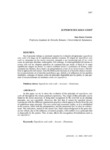Mostrar el registro sencillo del ítem
Superficies solo cedit
| dc.contributor.author | Zaera García, Ana | |
| dc.date.accessioned | 2011-07-12T10:23:49Z | |
| dc.date.available | 2011-07-12T10:23:49Z | |
| dc.date.issued | 2008 | |
| dc.identifier.citation | Anuario da Facultade de Dereito da Univesidade da Coruña, 2008, 12: 1007-1015. ISSN: 1138-039X | es_ES |
| dc.identifier.issn | 1138-039X | |
| dc.identifier.uri | http://hdl.handle.net/2183/7433 | |
| dc.description.abstract | [Resumen] En el presente trabajo se pretende mostrar la evolución del principio superficies solo cedit a lo largo de la experiencia jurídica romana. El origen de superficies solo cedit se encuentra en los mores maiorum, pasando a ser reconocido por el ius civile como un principio absoluto, inderogable. Sin embargo, la inderogabilidad del mismo se aviene mal con las distintas prácticas de construcción que desde el final de la etapa republicana surgen en Roma. La nueva realidad social y económica de Roma, como constatan las fuentes, lleva tanto a la jurisprudencia como al ius honorarium a flexibi- lizar la aplicación del mismo. Esta flexibilización iniciada en el derecho clásico encuen- tra reconocimiento en el derecho postclásico que, debido a la influencia de los pueblos orientales, consagra el mismo como un principio disponible por las partes, lo que per- mite el reconocimiento de institutos como ius superficici. | es_ES |
| dc.description.abstract | [Abstract] In this paper we try to show the evolution of the principle of superficies solo cedit all throughout the roman juridical experience. The origin of this principle can be found in the mores maiorum, it being later recognized by the civil law as an absolute principle, one not repealable. However, the fact that it cannot be repealed doesn’t correspond with the different construction practices which appear in Rome from the end of republican stage onwards. The new social and economic reality, as it is established in the sources, leads both the jurisprudence and the praetorian law to relax its enforce- ment. The relaxation, started in the classic law, finds acknowledgment in the post clas- sic law which, due to the influence of eastern peoples, will confirm it as a principle that is disposable by the parties. This, in turn, allows the recognition of institutions such as ius superficici. | es_ES |
| dc.language.iso | spa | es_ES |
| dc.publisher | Universidade da Coruña | es_ES |
| dc.subject | Superficies solo cedit | es_ES |
| dc.subject | Acessio | es_ES |
| dc.subject | Dominium | es_ES |
| dc.title | Superficies solo cedit | es_ES |
| dc.type | info:eu-repo/semantics/article | es_ES |
| dc.rights.access | info:eu-repo/semantics/openAccess |






